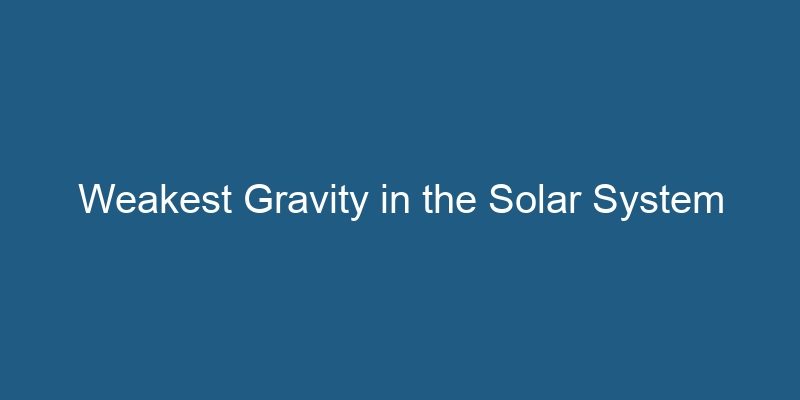The force of gravity is a fundamental concept in physics that influences various aspects of our lives. It is the force that keeps us grounded on Earth, determines the motion of celestial bodies, and plays a crucial role in the formation of galaxies. However, the strength of gravity is not the same on every celestial body in the solar system. In this article, we will explore the planets with the weakest gravity and understand the factors that contribute to it.
- 1. Introduction to Gravity
- 2. Factors Affecting Gravity on Planets
- 2.1. Mass of the Planet
- 2.2. Radius of the Planet
- 2.3. Density of the Planet
- 2.4. Rotation of the Planet
- Why Is Gravity So Weak?
- 3. Planets with Weakest Gravity
- 3.1. Mercury
- 3.2. Mars
- 3.3. Pluto
- 3.4. Moons with Weak Gravity
- 4. Implications of Weak Gravity
- 4.1. Difficulty in Retaining Atmosphere
- 4.2. Impact on Human Exploration
- 4.3. Geological Consequences
- 5. Conclusion
1. Introduction to Gravity
Gravity is the force that attracts objects with mass towards each other. It is responsible for the weight of an object and influences the dynamics of celestial bodies. The strength of gravity is determined by the mass and distance between objects. In the context of planets, the larger the mass and smaller the radius, the stronger the gravitational force.
2. Factors Affecting Gravity on Planets
There are several factors that contribute to the variation in gravity on different planets:
2.1. Mass of the Planet
The mass of a planet directly affects its gravitational pull. Planets with larger masses have stronger gravitational forces. For example, Jupiter, the largest planet in the solar system, has a much stronger gravity compared to Earth.
2.2. Radius of the Planet
The radius of a planet also plays a role in determining its gravity. A larger radius means that objects on the surface are farther from the planet’s core, resulting in weaker gravitational forces. Smaller planets like Mercury have weaker gravity due to their smaller radii.
2.3. Density of the Planet
The density of a planet affects its gravity by influencing its mass. A denser planet has more mass within a given volume, leading to a stronger gravitational force. For example, Earth’s gravity is stronger than that of Saturn due to its higher density.
2.4. Rotation of the Planet
The rotation of a planet can have a minor effect on its gravity. The centrifugal force generated by a planet’s rotation slightly counteracts the gravitational force. However, this effect is usually negligible compared to other factors.
Why Is Gravity So Weak?
3. Planets with Weakest Gravity
Now let’s explore the planets in our solar system with the weakest gravity:
3.1. Mercury
Mercury, the smallest planet in the solar system, has the weakest gravity. It has a mass of approximately 0.055 times that of Earth and a radius of about 0.383 times that of Earth. These factors contribute to its low surface gravity, which is approximately 0.38 times weaker than Earth’s gravity.
3.2. Mars
Mars, often referred to as the “Red Planet,” also has relatively weak gravity. With a mass of about 0.107 times that of Earth and a radius of approximately 0.532 times that of Earth, Mars has a surface gravity of about 0.38 times weaker than Earth’s gravity, similar to Mercury.
3.3. Pluto
Although no longer considered a planet, Pluto is worth mentioning due to its unique characteristics. Pluto has a mass of about 0.0022 times that of Earth and a radius of approximately 0.186 times that of Earth. This results in a surface gravity around 0.063 times weaker than Earth’s gravity.
3.4. Moons with Weak Gravity
In addition to planets, some moons in our solar system also have weak gravity compared to Earth:
- Deimos: One of Mars’ moons, Deimos, has a surface gravity of about 0.0006 times weaker than Earth’s gravity.
- Phobos: Mars’ other moon, Phobos, has an even weaker surface gravity, approximately 0.0005 times weaker than Earth’s gravity.
- Titan: Saturn’s moon Titan has a surface gravity roughly 0.14 times weaker than Earth’s gravity.
4. Implications of Weak Gravity
Planets and moons with weaker gravity have several implications:
4.1. Difficulty in Retaining Atmosphere
Weaker gravity makes it challenging for a planet or moon to retain an atmosphere. The low surface gravity cannot hold onto gases tightly, leading to the gradual loss of the atmosphere over time. This is evident in the case of Mars, which has a thin atmosphere compared to Earth.
4.2. Impact on Human Exploration
Exploring celestial bodies with weak gravity presents unique challenges for human missions. Astronauts experience reduced weight, making movements more effortless. However, the lack of gravity also affects various bodily functions and requires adaptation to prevent muscle and bone loss.
4.3. Geological Consequences
Weak gravity affects the geological processes on planets and moons. Erosion, volcanism, and tectonic activity may behave differently due to the reduced gravitational forces. Understanding these differences helps scientists gain insights into the geological history of celestial bodies.
5. Conclusion
Gravity varies across different planets and moons in our solar system due to factors such as mass, radius, density, and rotation. Mercury and Mars, being the smallest planets, have the weakest gravity among planets. Pluto, despite its reclassification, also has notably weak gravity. Moons like Deimos, Phobos, and Titan also exhibit weak gravity. The implications of weak gravity range from atmospheric loss to challenges in human exploration and geological consequences. Understanding these variations in gravity provides valuable insights into the dynamics of our solar system.

